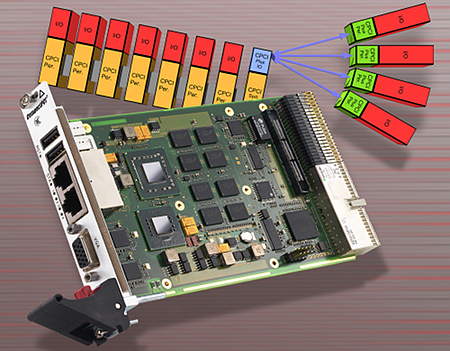CompactPCI board supports new PlusIO standard
Jul 30, 2009 — by LinuxDevices Staff — from the LinuxDevices Archive — 3 views MEN Micro announced a Linux-compatible CompactPCI SBC that it says is the first to follow the forthcoming PICMG 2.30 PlusIO standard. The F19P uses an Intel Core 2 Duo SP9300 processor, offers up to 8GB of DDR2 RAM, features multiple PCI Express links, and has five SATA ports with RAID support, the company says.
MEN Micro announced a Linux-compatible CompactPCI SBC that it says is the first to follow the forthcoming PICMG 2.30 PlusIO standard. The F19P uses an Intel Core 2 Duo SP9300 processor, offers up to 8GB of DDR2 RAM, features multiple PCI Express links, and has five SATA ports with RAID support, the company says.
According to MEN Micro, its new F19P — aimed at applications including industrial automation, transportation, and aerospace — is the first CompactPCI board that conforms to the forthcoming PICMG 2.30 PlusIO standard. The new standard defines a pinout for the J2 connector on existing CompactPCI system slots that was previously left free for user-defined I/O.
The new J2 pinout conveys serial functions such as four PCI Express x1 links, 4 SATA ports, 4 USB 2.0 ports, and two gigabit Ethernet interfaces to the backplane, MEN Micro says. The parallel PCI bus remains unchanged, meanwhile, but is now limited to a 32-bit width, the company adds.
At the same time, says MEN Micro, PICMG 2.30 PlusIO also involves changing the physical connector for J2 to a new Ultra Hard Metric connector produced by 3M. It's said the UHM connector, while physically compatible with its predecessor, dramatically reduces the severe crosstalk previously experienced at speeds over 1Gbps. As a result, it's now possible to support SATA and PCI Express transmission rates.

As this image dramatizes, MEN Micro's F19P uses a PICMG 2.30 PlusIO connector
(Click to enlarge)
In addition to offering the PCI Express x1 links mentioned above via the J2 connector, MEN Micro's F19P is said to offer three PCIe x 1 links for its triple gigabit Ethernet interfaces, plus a PCIe x 4 (or 4 x 1) links that are available via rear I/O or an optional side card. Real-world ports on the front of the board serve up two of the Ethernet interfaces, two USB 2.0 ports, and a VGA output, the company adds.
The F19P divides up the rest of its I/O between the connectors on the rear and side of the board. For example, four USB 2.0 ports are available at the rear of the board, and four more via a side-card connector, according to MEN Micro.
MEN Micro says the F19P uses a Intel Core 2 Duo SP9300 clocked at 2.26GHz, backed up by Intel's GS45 and ICH9ME southbridge. Featuring a 6MB second-level cache and a frontside bus that may be set to either 1066MHz or 800MHz, the board is said to offer up to 4GB of soldered-on DDR3 memory.
According to MEN Micro, CompactFlash or microSD storage may be added via two of the board's USB interfaces. Alternatively, hard disks may be connected to the device's five SATA ports, and configured as RAID 0/1/5/10 arrays, the company says.
Features and specifications listed by MEN Micro for the F19P include the following:
- Processor — Intel Core 2 Duo SP9300 clocked at 2.26GHz
- Memory — Up to 4GB of soldered-on DDR3 RAM
- Networking — 3 x gigabit Ethernet (1 on front of board; 1 via rear connectors)
- Other I/O:
- 5 x SATA (4 via rear; 1 via side-card connector)
- 1 x VGA (on front of board)
- 2 x SDVO (via side-card connector)
- 12 x USB 2.0:
- 2 x front panel connectors
- 4 via side-card connectors
- 4 via rear I/O
- 2 dedicated to addition of CompactFlash or microSD
- Expansion:
- PCI Express:
- 3 x 1 links, normally used to connect gigabit Ethernet interfaces
- 1 x 4 or 4 x 1 link available via side-card connector or rear I/O
32-bit, 33MHz CompactPCI bus
- PCI Express:
- Power requirements — +5VDC; can supply 3.3VDC to other boards (maximum load 15 Watts)
- Operating range — 32 to 140 deg. F (0 to 60 deg. C)
- Dimensions — 6.3 x 3.93 inches (160 x 100mm)
Further information
According to MEN Micro, the F19P is available now, and is compatible with 64- and 32-bit editions of Linux and Windows. More information may be found on the company's website, here.
This article was originally published on LinuxDevices.com and has been donated to the open source community by QuinStreet Inc. Please visit LinuxToday.com for up-to-date news and articles about Linux and open source.